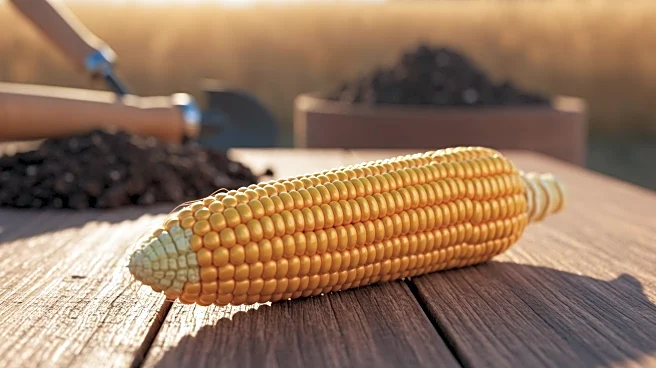What's Happening?
Illinois agriculture is projected to produce over 2 billion bushels of corn in 2025, maintaining its position as a leading state in U.S. corn output. The state dedicates over 26 million acres to farming, which constitutes about 75% of its land area. This extensive agricultural activity supports a diverse range of crops and livestock, including soybeans, wheat, hay, pumpkins, melons, sweet corn, beef, pork, and dairy. Technological advancements such as AI, precision monitoring, and satellite technology are transforming the agricultural landscape, enhancing productivity and sustainability. Illinois agriculture is expected to support more than 600,000 jobs statewide, impacting both rural and urban communities.
Why It's Important?
Illinois' agricultural sector plays a crucial role in the U.S. economy, contributing significantly to food supply chains and renewable energy initiatives like ethanol biofuel. The state's leadership in corn and soybean production positions it as a vital contributor to both national and global markets. The integration of technology in farming practices not only boosts efficiency but also supports environmental sustainability, which is increasingly important in the face of climate change. The job growth in agriculture provides economic stability and opportunities for diverse roles, from traditional farming to high-tech positions, benefiting the state's workforce.
What's Next?
Illinois agriculture is poised to continue its leadership in grain production while expanding into sustainable high-value crops and livestock. The adoption of smart farming techniques and advanced supply chain systems will further enhance productivity and environmental stewardship. As the state adapts to climate challenges and global market fluctuations, ongoing investment in technology and workforce training will be essential to maintain its competitive edge. Stakeholders, including farmers, policymakers, and agribusinesses, will need to collaborate to address issues such as labor shortages and input costs, ensuring the sector's resilience and growth.
Beyond the Headlines
The focus on sustainability in Illinois agriculture highlights ethical and environmental considerations, with practices like cover cropping and reduced tillage aimed at preserving soil health and reducing carbon footprints. The use of blockchain for traceability ensures the authenticity of Illinois-grown products, enhancing consumer trust and market access, particularly for exports. These initiatives reflect a broader shift towards responsible and transparent agricultural practices, which could influence national policies and consumer expectations in the long term.










